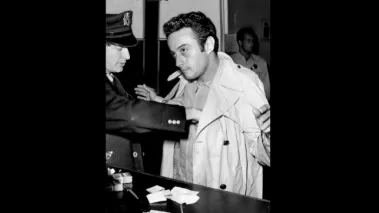Table of Contents
Laughing at the iron fist

When the hero laughs at the bad guy in a movie, what is he doing? Is he genuinely amused by the actions of the antagonist? Or is it a show of power? A way for the hero to disarm the villain?
Laughter rejects power. If the good guy in a movie instead angrily screams and kicks and yells at the villain, there is an affirmation of the bad guy’s power. The hero would be saying: “I am upset because you have power, and I don’t like it.” When he chuckles a long, hearty laugh towards the villain, he says: “Your power is a joke.” While outspoken hatred, mass protests, and political opposition implicitly acknowledge the power of the authoritarian, comedy turns it into the butt of a joke — all but daring it to take action. It is for this reason that the authoritarian, who craves and requires power over everything, fears laughter the most.
There is recent evidence of the authoritarian fear of comedy. In Turkey, President Recep Tayyip Erdogan’s government has arrested students who drew political cartoons depicting Erdogan as various animals. In 2013, popular Egyptian satirist Bassem Youssef was arrested by the Egyptian police for making fun of former President Mohamed Morsi’s hat. In China, comedians must send their scripts through political censors who remove most jokes made about the government or its officials. And in North Korea, Supreme Leader Kim Jong-un outright banned sarcasm. Time and time again, all over the globe, comedians are censored by their authoritarian rulers. These oppressive presidents, prime ministers, and supreme leaders all have in common a fear of being laughed at.
In depriving the authoritarians of their power to cultivate a culture of deference and obedience, they challenge established norms and galvanize their audiences to join them. In this way, comedians are some of the strongest defenders of free speech and civil liberties. They require by nature a freedom to criticize, a certain liberty to point and laugh at everything from the droll, mundane situations of life to problems of immense social and political importance. And because comedians both need and thrive off of the freedom of speech, it is often the first civil liberty that is thrown out of the window when the authoritarian decides there’s been one too many jokes about his hat.
The authoritarian impulse to censor can be seen on a smaller scale in educational institutions across the United States. Even though students do not often fear arrest from their government for their speech, they do still worry that their educational futures may be imperiled by their expression. Each college has a top-down design of authority. The rules come from the administrators and they are to be obeyed by the students. We as a society have vested in our schools this authoritarian structure for reasons of enforcing discipline and ensuring a safe learning environment. But even such good intentions can have unintended consequences. An authoritarian structure, whether at school or in the government of a nation, creates an incentive to censor comedy to insulate its power.
School administrators routinely use this authoritarian mandate to suppress comedy. In 2005, Washington State University paid for the tickets of students who disrupted the production of another student’s satirical play, The Passion of the Musical. When stand-up comedian Hannibal Buress made jokes about sexual abuse in the Catholic Church during his set at Loyola University Chicago, university administrators cut his mic. And a public high school in New York ordered the removal of swastikas from a student production of The Producers, a well-known satirical musical that ridicules Adolf Hitler.
As you can see in these examples, the comedy doesn’t even need to be directed at the administration to warrant censorship. All comedy, regardless of its target, threatens the power of the authoritarian. It has this effect because it dares those in power to take action. Satirical newspapers, stand-up sets, and funny home-videos have the ability to push boundaries, break rules, and upset social norms. Comedy requires elements of shock and surprise to work. Try telling the same joke twice in a row. It probably won’t be funny the second time around. The basis of so much comedy is the rejection of established rules — especially in schools, where students are surrounded by endless codes and policies. It is defined by the willingness to push the envelope and give an audience something fresh and funny. That intention in and of itself is a challenge to authority. It’s a check on power. And it’s a necessary one.
Ben Lee is a FIRE summer intern and rising junior at Cornell University
Recent Articles
FIRE’s award-winning Newsdesk covers the free speech news you need to stay informed.

FIRE to SCOTUS: TikTok ban violates Americans' First Amendment rights

California and other states are rushing to regulate AI. This is what they’re missing

One day after FIRE lawsuit, Congress passes changes to filming permits in national parks
